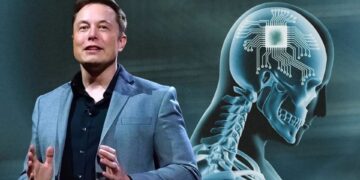The FDA has granted permission for Elon Musk’s brain-chip company to carry out its initial human tests, according to the company.
By connecting people’s brains to computers, the Neuralink implant company hopes to help them regain their vision and mobility.
It claims that there are no immediate plans to begin seeking participants. Previous attempts by Mr. Musk to start testing were unsuccessful.
The FDA acknowledged Neuralink’s announcement, according to them.
According to a March report by the Reuters news agency, which included multiple current and former employees, an earlier attempt by Neuralink to obtain FDA approval was turned down on safety grounds.
- What is Neuralink?
Neuralink wants to use its microchips to help some disabled people use computers and mobile technology, as well as to treat conditions like paralysis and blindness.
The chips, which have been tested on monkeys, are intended to decipher brain signals and transmit knowledge to gadgets via Bluetooth.
Neuralink’s brain implants will need to undergo extensive testing to get past ethical and technical obstacles before they can be made widely available, experts have warned.
Additionally, Mr. Musk has previously asserted that the proposed technology might allay worries that AI will displace humans in the future.
Neuralink noted a “important first step that will one day allow our technology to help many people” when announcing the news on Thursday.
The approval was “the result of incredible work by the Neuralink team in close collaboration with the FDA”, it said.
The firm promised more information “soon” on plans to sign up trial participants.
According to its website, the engineering process gives “safety, accessibility, and reliability” top priority.
The business, which Mr. Musk helped co-found in 2016, has a history of exaggerating how quickly it can carry out its strategies.
The initial plan was to begin implanting chips in people’s brains in 2020 in order to fulfill a promise made the previous year. Later, it promised to begin in 2022.
In December of the previous year, the company suffered yet another setback after it was allegedly under investigation for alleged violations of animal welfare in its operations. Similar claims were previously refuted.
Its FDA approval announcement for human testing comes on the heels of recent reports of a related development involving brain implants by Swiss researchers.
A paralysed man from the Netherlands was able to walk simply by thinking about it – thanks to a system of implants which wirelessly transmit his thoughts to his legs and feet.






























Hello, Coupled with recent breakthroughs in brain implants, this progress offers hope for individuals facing physical limitations and paves the way for a future where technology can greatly enhance human capabilities.